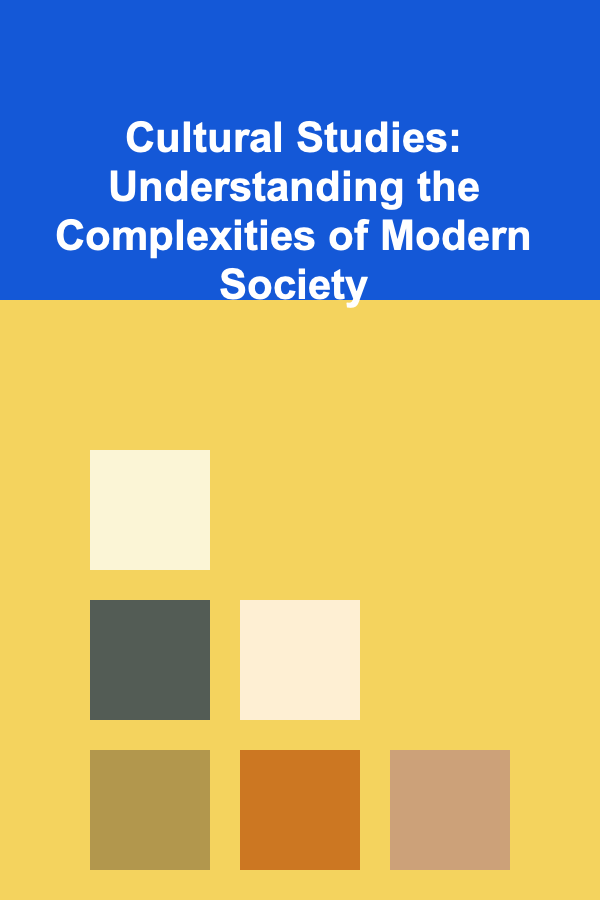
Cultural Studies: Understanding the Complexities of Modern Society
ebook include PDF & Audio bundle (Micro Guide)
$12.99$5.99
Limited Time Offer! Order within the next:

Cultural studies is an interdisciplinary field that emerged in the mid-20th century to analyze cultural phenomena in their historical, social, and political contexts. It aims to understand how culture shapes and is shaped by society, focusing not only on popular culture but also on issues of identity, power, ideology, and media. In modern society, cultural studies plays a vital role in unraveling the complexities of cultural dynamics and the forces that drive societal change. This article delves deep into the subject, examining its key components, methodologies, and relevance in understanding the challenges of the contemporary world.
The Evolution of Cultural Studies
Cultural studies originated in the United Kingdom in the 1960s, with the establishment of the Birmingham School at the Centre for Contemporary Cultural Studies (CCCS). Scholars like Richard Hoggart, Stuart Hall, and Raymond Williams laid the foundation for this discipline by challenging traditional notions of culture and introducing new ways to analyze media, literature, and everyday life. They argued that culture is not simply a collection of high art or national traditions but a dynamic, lived experience shaped by social power, class struggles, race, gender, and other intersecting factors.
Over the decades, cultural studies has evolved and expanded globally, incorporating ideas from Marxism, postcolonialism, feminism, psychoanalysis, and postmodernism. It now addresses a broad range of issues, from globalization to digital media, consumerism, and cultural resistance. In its contemporary form, cultural studies seeks to explore the diverse ways people experience, produce, and negotiate culture within the complex power structures of modern society.
Key Concepts in Cultural Studies
To fully understand the complexities of modern society through the lens of cultural studies, several key concepts are essential. These concepts help to frame cultural practices within larger socio-political contexts and enable us to critically assess the forces that influence cultural production and consumption.
1. Ideology and Power
At the heart of cultural studies is the idea that culture is not neutral; it is deeply intertwined with power. Cultural products---such as media, literature, music, and even fashion---serve to reinforce or challenge dominant ideologies. Ideology refers to the system of beliefs, values, and assumptions that shape our understanding of the world. It often reflects the interests of powerful groups in society.
Cultural studies scholars, particularly those influenced by Marxism, examine how ideologies maintain social inequalities. For example, media representations of gender, race, and class can perpetuate stereotypes that benefit certain groups while marginalizing others. This analysis extends beyond traditional institutions like the state or the economy to include cultural industries like film, advertising, and journalism, which actively produce and distribute ideologies.
2. Hegemony and Resistance
Stuart Hall's concept of hegemony plays a crucial role in understanding cultural power. Hegemony refers to the dominance of one social group over others, not just through coercion but through the consent of those being dominated. Cultural hegemony, therefore, involves the widespread acceptance of dominant values, norms, and practices, even by those who are disadvantaged by them.
However, cultural studies also emphasizes the potential for resistance. Individuals and communities often push back against dominant cultural narratives through subcultures, countercultures, and acts of protest. This resistance can take many forms, from the development of alternative media to social movements advocating for marginalized groups. Cultural studies explores how these acts of resistance challenge or subvert hegemonic cultural practices and bring about social change.
3. Identity and Representation
Identity is a central theme in cultural studies, as it relates to how individuals and groups perceive themselves and are perceived by others. Cultural identity is shaped by a variety of factors, including race, ethnicity, gender, sexuality, nationality, and class. These identities are not fixed but are constantly negotiated and redefined through cultural practices.
Representation plays a significant role in the construction of identity. The way people and groups are represented in media, literature, and other cultural forms affects how they are understood and treated in society. Cultural studies scholars critically analyze how different groups are portrayed, asking questions like: Who controls the representation of marginalized groups? What stereotypes are perpetuated, and how do these representations shape public perceptions?
In modern society, globalization and digital media have complicated the process of identity formation. Individuals now interact with a global network of cultures and media, leading to the emergence of hybrid identities. This intersection of local and global influences has given rise to new forms of cultural expression but has also raised questions about cultural appropriation and the impact of global capitalism on local cultures.
4. Globalization and Cultural Exchange
Globalization refers to the increasing interconnectedness of the world through the movement of people, goods, ideas, and technologies. While globalization has created opportunities for cultural exchange and the dissemination of diverse cultural products, it has also led to the dominance of certain global powers---particularly Western cultural industries.
Cultural imperialism, the idea that global cultural products (especially from the U.S. and Europe) dominate and influence local cultures, is a key concern in cultural studies. While globalization allows for the sharing of cultural practices and the emergence of transnational identities, it also raises questions about cultural homogenization. How do local cultures resist or adapt to these dominant forces? And what happens to indigenous cultures when they are overwhelmed by global cultural products?
Cultural studies addresses these questions by examining the ways in which global media corporations, social media platforms, and multinational industries impact local cultural landscapes. The rise of the internet, in particular, has shifted the dynamics of globalization, allowing for new forms of cultural exchange and activism.
5. Media and Technology
In the 21st century, media and technology have become central to cultural production and consumption. Cultural studies has long been interested in the role of media in shaping society, from print newspapers and television to the internet and social media. Media, in its various forms, is not just a means of entertainment; it is a powerful tool for shaping public opinion, influencing political decisions, and constructing social reality.
The rise of digital media has transformed cultural consumption. Streaming platforms, social media networks, and user-generated content have disrupted traditional forms of media production and distribution. Cultural studies scholars now examine how these digital platforms contribute to the spread of ideologies, reinforce or challenge power structures, and influence cultural trends. They also explore issues such as privacy, surveillance, and the digital divide, which highlight the complex relationships between technology, culture, and society.
The Relevance of Cultural Studies in Modern Society
The complexity of modern society demands a nuanced understanding of culture. From the rise of global capitalism to the emergence of social justice movements, cultural studies offers valuable tools for understanding the forces that shape contemporary life. By analyzing how culture interacts with power, identity, and social structures, we gain insight into the challenges facing the modern world.
1. Understanding Social Movements
Cultural studies provides a critical framework for understanding contemporary social movements, such as those advocating for racial justice, gender equality, and LGBTQ+ rights. These movements often challenge hegemonic cultural norms and demand new forms of representation and inclusion. Cultural studies scholars analyze how these movements use media, symbols, and collective action to reshape cultural narratives and promote social change.
2. Navigating Cultural Diversity
In a globalized world, cultural studies helps us navigate the complexities of cultural diversity. It encourages critical reflection on how cultures interact, clash, and coalesce in the modern world. By examining the power dynamics at play in cultural exchanges, cultural studies provides insights into how we can foster greater understanding, tolerance, and respect across cultures.
3. Media Literacy and Criticism
In an age of mass media saturation, cultural studies fosters media literacy, encouraging individuals to critically engage with the content they consume. Understanding how media shapes our perceptions of reality, identity, and power is essential for navigating the complexities of modern society. Cultural studies also provides the tools to critique media representations, from news coverage to advertisements, and to understand their underlying ideological motives.
Conclusion
Cultural studies offers a profound and essential framework for understanding the intricacies of modern society. By critically examining culture through the lenses of power, identity, resistance, and media, cultural studies allows us to confront the social, political, and economic forces that shape our lives. In a rapidly changing world marked by globalization, technological advancements, and shifting social norms, cultural studies remains a vital tool for navigating the complexities of contemporary life. It challenges us to rethink what we know about culture, encouraging us to engage with the world in a more informed, critical, and empathetic manner.

How to Create a Checklist for Enhancing Your Content's Tone and Voice: An Actionable Guide
Read More
How to Organize Your Email Inbox for Better Productivity
Read More
How to Stage Your Home for Virtual Tours and Online Listings
Read More
How to Interpret Ancient Religious Practices
Read More
How to Foster Lifelong Mental Wellness
Read More
10 Tips for Mobile App Localization: Reaching a Global Audience
Read MoreOther Products

How to Create a Checklist for Enhancing Your Content's Tone and Voice: An Actionable Guide
Read More
How to Organize Your Email Inbox for Better Productivity
Read More
How to Stage Your Home for Virtual Tours and Online Listings
Read More
How to Interpret Ancient Religious Practices
Read More
How to Foster Lifelong Mental Wellness
Read More